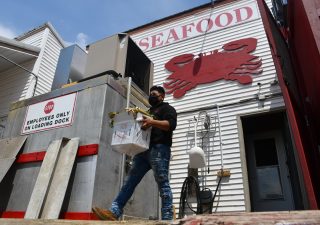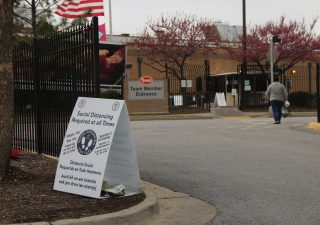Migrant seafood-processing workers, who are legally hired and transported to the U.S. each season through the federal H-2B visa program, face heightened risks of catching COVID-19.
The Howard Center for Investigative Journalism
Podcast: Airport workers faced COVID risks as airlines advertised passenger safety measures
Conversations about the safety of air travel have largely left airport workers out. The choice of whether or not to fly in a pandemic is a question of community safety and how the decision affects people with the least protection. Meet some of them in the Howard Center podcast In The Air.
At least 9,000 Arkansas workers caught COVID-19 as pandemic overwhelmed regulators, companies
In working conditions that stress a quick turnaround on products, have close contact between employees and brisk temperatures, poultry workers say they were put at risk for catching the virus.
Massachusetts health departments overwhelmed, unprepared to protect workers
With federal regulators missing from the field and state leaders scrambling to manage the COVID-19 crisis, Massachusetts’ 351 overtaxed local boards of health were unwittingly thrust into a new role last year — overseers of workplace safety.
As Walmart sales soared, workers got scant COVID-19 protection from OSHA
Walmart, the nation’s largest private employer, provides a window into OSHA’s performance during the pandemic.
About Essential and Exposed
These stories were produced by the Howard Center for Investigative Journalism, part of the Philip Merrill College of Journalism at the University of Maryland, in collaboration with journalists from Boston University, the University of Arkansas and Stanford University. The mission…
Settlement in Idaho case strengthens homeless protections
Homeless people in Boise with nowhere else to sleep can no longer be arrested for doing so in public, under the terms of the settlement announced by the city and plaintiffs.
Wall Street investors pricing Americans out of last bastion of affordable housing
Some of Wall Street’s largest investment firms, including Apollo Global Management, The Blackstone Group and Brookfield Asset Management, are now landlords to some of America’s poorest residents.
Legislative efforts to protect trailer park residents from eviction show mixed results
The plight of residents in mobile home communities has caught the attention of state and federal lawmakers, who are working to craft legislation that would safeguard the rights of homeowners while helping to keep rents affordable.
Public housing, the last refuge for the poor, threatens to kick out tenants for small debts
Public housing is supposed to be a solution to homelessness, not a cause of it. The Howard Center for Investigative Journalism analyzed four years of eviction data to find out why five public-housing authorities are taking so many of their clients to court.







